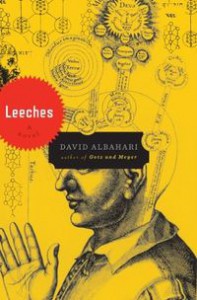 [Houghton Mifflin Harcourt; 2011]
[Houghton Mifflin Harcourt; 2011]
Tr. from Serbian by Ellen Elias-Bursac
by Kehan Desousa
In David Albahari’s Leeches, both form and content demand great attention from the reader. Part of this stems from the unreliability of the narrator; however, the main challenge arises from Albahari’s winding, short-claused sentences, as well as the absence of paragraphs. Yet the structure, which alternately drags and rushes ahead, reflects the narrator’s exhausted, anxious mental state more effectively than even the substance of his recollections of Serbia in the early nineties.
To be sure, the narrator’s nerves are explicable—after witnessing a woman being slapped on the shores of the Danube, he embarks upon an increasingly convoluted quest to discover why this occurred. Each subsequent clue leads to more baffling puzzles and arcane symbols, forcing him to seek the help of a mathematician and the Jewish Kabbalist community of Zemun, the mid-size city where he free-lances as an opinion columnist. While the narrator grows more obsessed with solving the mystery of the slap, the symbols, and his presumptive role within the scheme, he to a commensurate degree grows closer to the beleagured Jewish community, writing overt essays demanding greater tolerance for Serbia’s minorities and attracting greater hostility from the supporters of nationalism.
The conspiracy, no less maddening for the reader than the narrator, occurs in the later days of Yugoslavia’s bitter disintegration, yet the narrator alludes to major civil conflicts and the rise of Slobodan Milosevic only rarely. Rather, he dives into untangling the conspiracy as a distraction from the increasingly bellicose nationalism of Serbia, as if cracking the smaller conspiracy will somehow throw the larger chaos of his country into understandable relief. Says the narrator, aware of his own fixation:
This is our remarkable ability as humans to attribute a meaning to everything, as if nothing happens just because it happens, as if everything is a basis or a mirror of a secret, if not the secret itself, whatever that secret might be.
The secret, of course, is that even the solving of the smaller mystery fails to realign the world. Albahari’s skill in immersing the reader in this grim conclusion justifies the energy required to follow the story, which at times feels like listening to a friend breathlessly recount a particularly confusing dream. The disappointment of incomprehension felt by the narrator seeps from the page to the reader, who, after completing this mystifying novel, surely recognizes the dissatisfaction of searching for a pattern where none exists.
This post may contain affiliate links.








